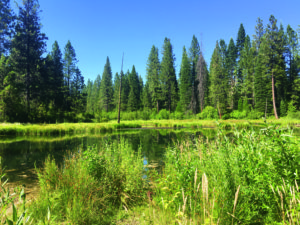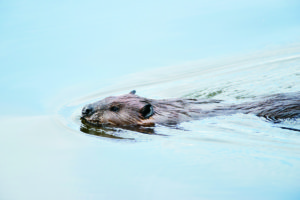
Summer 2018 ForestLife
Saving beavers, headwaters, and tall timbers at McCloud Soda Springs
A vision of luxury estates gives way to homes for fish and wildlife and the conservation of a historic working forest
 Picture your vacation home here: Incredible views of majestic Mount Shasta. Gently rolling woods. Plenty of cold, clear water bubbling up from dozens of volcanic springs—along with the healing waters of the famed Soda Springs itself. All nestled right next to a golf course at the edge of the historic timber town of McCloud, a short drive from Interstate 5, and among world class outdoor recreational opportunities for fishing, climbing, and horseback riding.
Picture your vacation home here: Incredible views of majestic Mount Shasta. Gently rolling woods. Plenty of cold, clear water bubbling up from dozens of volcanic springs—along with the healing waters of the famed Soda Springs itself. All nestled right next to a golf course at the edge of the historic timber town of McCloud, a short drive from Interstate 5, and among world class outdoor recreational opportunities for fishing, climbing, and horseback riding.
Now, 50 luxury home sites on the Soda Springs property will never be built as golf course estates, thanks to Susannah Schroll and a conservation partnership led by Pacific Forest Trust. Instead, we are building a sustainable forest future and preserving this rural community’s way of life and economy.
In early 2015, the wheels of fate shifted decisively in favor of fish, wildlife, and natural wonders when the almost 1400-acre McCloud Soda Springs property was auctioned off by its then development-minded owner. Long a practitioner of sustainable forest and range management, Ms. Schroll came forward and made a risky investment in the property not to develop it, but to conserve it—benefitting beavers and rainbow trout, wildlife and working people. This year, Schroll Timberlands LLC granted a conservation easement to Pacific Forest Trust, protecting this well-managed, bountiful forest and its four beaver ponds in perpetuity, a rare win over looming development.
McCloud Soda Springs is part of the ancestral homeland of the Wintu. The first European settlement in the area was on this property, which became part of the original McCloud Lumber Company lands when the mill was built at the turn of the 20th century. Then-owner Champion International took the property out of Timber Production Zoning around 1990 and rezoned it for residential subdivision.
The conservation easement agreed to between Schroll and PFT ensures Soda Springs will never be subdivided. The terms provide that only one house can be built on the property, potentially for a caretaker or to house an environmental education program. After over a century in timber production, the relatively young ponderosa pine and mixed conifer forest stands will be managed to restore their natural diversity and enhance habitat values, especially for wildlife that need older forests with big trees, large limbs, and furrowed bark or cavities perfect for nesting.
The conservation easement requires uneven-aged management and limits logging to no more than a quarter of the timber volume in any decade, well below the rate at which the forest is currently growing. This means more carbon dioxide will be pulled out of the air and permanently stored in these stands, reducing the dangerous levels of greenhouse gases that fuel climate change. To increase resiliency to fire and drought, the pine stands will be managed for more diverse spacing, reducing competition among the trees and leading to bigger trees overall.

At McCloud Soda Springs, we are restoring a wide variety of habitats, including beaver ponds. Beavers such as this one play an important role by making the landscape more resilient to climate change. Beaver dams improve water storage, water quality, and stream function.
More than 165 acres of the property—including beaver ponds, mineral springs, oak woodlands, a seasonal wet meadow, and a ponderosa pine savannah—will be managed exclusively to conserve and restore rare habitat values. Many rare or threatened animals such as the Pacific fisher, willow flycatcher, and sharp shinned hawk use these habitat types. Northern spotted owl nest nearby, and the gray wolf has been seen moving through. Mountain lion, black bear, and black-tailed deer all spend time at Soda Springs.
PFT’s acquisition of the conservation easement was funded by $1,670,000 in grants from the California Department of Fish and Wildlife under Proposition 1, the Resources Agency’s Environmental Enhancement and Mitigation Program, the Wildlife Conservation Board under Proposition 40, and the Joseph and Vera Long Foundation. These grants were supplemented by a generous donation from Schroll Timberlands.
The conservation of McCloud Soda Springs helps the state achieve many goals that benefit the public, including protecting critical cold water sources for the endangered winter-run Chinook salmon downstream in the Sacramento River—which are also important flows for more than 28 million Californians downstream. Working together with public and private partners, PFT has permanently protected 35,000 acres of working forests in the McCloud watershed. This voluntary conservation collaboration supports wood products and outdoor jobs in the low-income communities of Siskiyou County while contributing to a 3 million acre network of interconnected public and private protected forests in this headwaters region.
Photo Credit (beaver): Seokhee Kim
More in this Issue of ForestLife
- President’s Letter
- Restoring carbon rich, climate resilient forests across the west coast
- A first for Oregon: Mountcrest Forest conserved
- What price a watershed?
- Pioneering progress on forest and climate policy
- Donor Profile: Andrea Tuttle, PhD
- Forestry at Soda Springs: Back to the future
- A fabulous Forest Fete!
